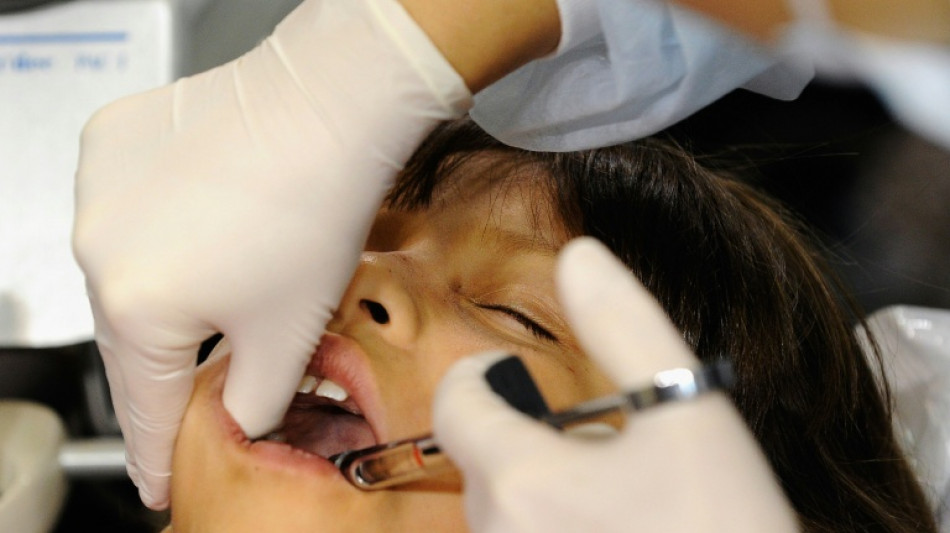
-
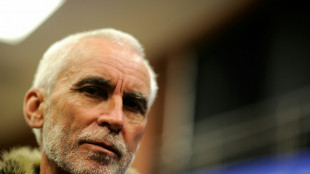 New Zealand 'Once Were Warriors' director Tamahori dies
New Zealand 'Once Were Warriors' director Tamahori dies
-
Hungary's Orban wins Russian oil sanctions exemption from Trump

-
 More than 1,000 flights cut in US shutdown fallout
More than 1,000 flights cut in US shutdown fallout
-
Turkey issues genocide arrest warrant against Netanyahu

-
 Countries agree to end mercury tooth fillings by 2034
Countries agree to end mercury tooth fillings by 2034
-
Hamilton faces stewards after more frustration

-
 World's tallest teen Rioux sets US college basketball mark
World's tallest teen Rioux sets US college basketball mark
-
Trump pardons three-time World Series champ Strawberry

-
 Worries over AI spending, US government shutdown pressure stocks
Worries over AI spending, US government shutdown pressure stocks
-
Verstappen suffers setback in push for fifth title

-
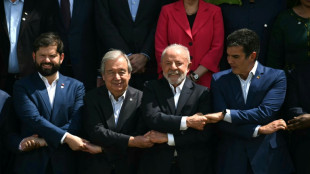 Earth cannot 'sustain' intensive fossil fuel use, Lula tells COP30
Earth cannot 'sustain' intensive fossil fuel use, Lula tells COP30
-
Wales boss Tandy expects Rees-Zammit to make bench impact against the Pumas

-
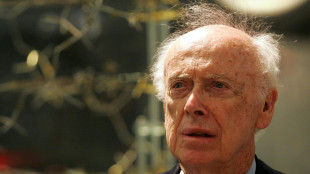 James Watson, Nobel prize-winning DNA pioneer, dead at 97
James Watson, Nobel prize-winning DNA pioneer, dead at 97
-
Sabalenka beats Anisimova in pulsating WTA Finals semi

-
 Iran unveils monument to ancient victory in show of post-war defiance
Iran unveils monument to ancient victory in show of post-war defiance
-
MLS Revolution name Mitrovic as hew head coach

-
 Brazil court reaches majority to reject Bolsonaro appeal against jail term
Brazil court reaches majority to reject Bolsonaro appeal against jail term
-
Norris grabs pole for Brazilian Grand Prix sprint race

-
 More than 1,200 flights cut across US in govt paralysis
More than 1,200 flights cut across US in govt paralysis
-
NFL Cowboys mourn death of defensive end Kneeland at 24

-
 At COP30, nations target the jet set with luxury flight tax
At COP30, nations target the jet set with luxury flight tax
-
Trump hosts Hungary's Orban, eyes Russian oil sanctions carve-out

-
 All Blacks 'on edge' to preserve unbeaten Scotland run, says Savea
All Blacks 'on edge' to preserve unbeaten Scotland run, says Savea
-
Alpine say Colapinto contract about talent not money

-
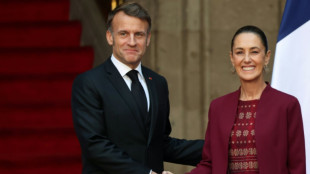 Return of centuries-old manuscripts key to France-Mexico talks
Return of centuries-old manuscripts key to France-Mexico talks
-
Byrne adamant Fiji no longer overawed by England

-
 Ex-footballer Barton guilty over 'grossly offensive' X posts
Ex-footballer Barton guilty over 'grossly offensive' X posts
-
Key nominees for the 2026 Grammy Awards

-
 Brazil court mulls Bolsonaro appeal against jail term
Brazil court mulls Bolsonaro appeal against jail term
-
Rybakina sinks Pegula to reach WTA Finals title match

-
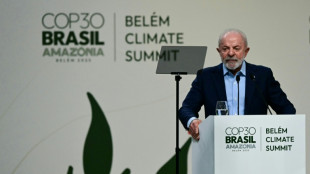 Earth 'can no longer sustain' intensive fossil fuel use, Lula tells COP30
Earth 'can no longer sustain' intensive fossil fuel use, Lula tells COP30
-
Kendrick Lamar leads Grammy noms with nine

-
 Ex-British soldier fights extradition over Kenyan woman's murder
Ex-British soldier fights extradition over Kenyan woman's murder
-
Kolisi to hit Test century with his children watching

-
 Alex Marquez fastest in practice ahead of Portuguese MotoGP
Alex Marquez fastest in practice ahead of Portuguese MotoGP
-
Will 'war profiteer' Norway come to Ukraine's financial rescue?

-
 Tech selloff drags stocks down on AI bubble fears
Tech selloff drags stocks down on AI bubble fears
-
Blasts at Indonesia school mosque injure more than 50

-
 Contepomi says lead-in to Wales match a 'challenge' for Argentina
Contepomi says lead-in to Wales match a 'challenge' for Argentina
-
Greece woos US energy deals, as eco groups cry foul
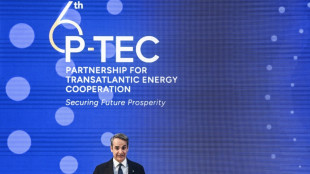
-
 Frank says Spurs supporting Udogie through 'terrible situation'
Frank says Spurs supporting Udogie through 'terrible situation'
-
MSF warns of missing civilians in Sudan's El-Fasher

-
 Norris on top as McLaren dominate opening Sao Paulo practice
Norris on top as McLaren dominate opening Sao Paulo practice
-
UN warns 'intensified hostilities' ahead in Sudan despite RSF backing truce plan

-
 Seven hospitalized after suspicious package opened at US base
Seven hospitalized after suspicious package opened at US base
-
Guardiola says 'numbers are insane' as he reaches 1,000 games in charge

-
 Brazil welcomes China lift of ban on poultry imports
Brazil welcomes China lift of ban on poultry imports
-
Scotland captain Tuipulotu bids for landmark win over All Blacks

-
 Woman convicted in UK of harassing Maddie McCann's parents
Woman convicted in UK of harassing Maddie McCann's parents
-
Tanzania charges more than 100 with treason over election protests


Countries agree to end mercury tooth fillings by 2034
Countries agreed Friday to phase out the use of mercury-based dental amalgams in tooth fillings by 2034, in a move that will change how dentistry is done around the world.
At a conference in Geneva, signatories to a treaty aimed at protecting human health and the environment from mercury pollution decided to call time on mercury amalgams.
Nations agreed "to end the use of dental amalgam by 2034, marking a historic milestone in reducing mercury pollution", the conference announced in its closing statement.
The World Health Organization considers mercury one of the top 10 chemicals of major public health concern, calling it "toxic to human health".
Some countries have already banned its use in dental amalgam, a common filling material for treating tooth decay used for more than 175 years.
The Minamata Convention on Mercury is an international treaty to protect human health and the environment from the adverse effects of mercury and mercury compounds.
More than 150 countries are party to the convention, which was adopted in 2013 and came into force in 2017.
The sixth conference of parties to the treaty, held in Geneva this week, adopted amendments "establishing a global phase-out of dental amalgam by 2034", the closing statement said.
"This science-based, time-bound agreement marks a decisive step toward the total elimination of mercury use in dentistry and a safer future for all communities."
- African initiative -
The treaty already stipulated that signatories must take measures to phase out the use of mercury-based dental amalgams.
However, a bloc of African countries wanted to go further, with a ban on their production, import and export, starting in 2030.
In a video message as the conference opened on Monday, US Health Secretary Robert F. Kennedy Jr. asked why mercury was deemed "dangerous in batteries, in over-the-counter medications and make-up", but acceptable in dental fillings.
"It's inexcusable that governments around the world still allow mercury-based compounds in healthcare -- and safe alternatives exist," he said.
A few countries opposed the idea of a phase-out by 2030, including Iran and India, and Britain, which said it was too soon.
But countries came together and agreed a phase-out by 2034.
"We have just opened the door to another chapter of the mercury history book," said the convention's executive secretary Monika Stankiewicz.
"Mercury pollution is a scourge."
However, "by understanding one another and bridging our differences, we can make a difference in the lives of people everywhere, and indeed in the life of this beautiful planet we share".
The conference's president Osvaldo Alvarez Perez added: "We have set ambitious new goals, and left mercury a little further behind."
Overall, the conference adopted 21 decisions aimed at advancing the convention's objective of protecting human health and the environment from mercury pollution.
S.Spengler--VB




